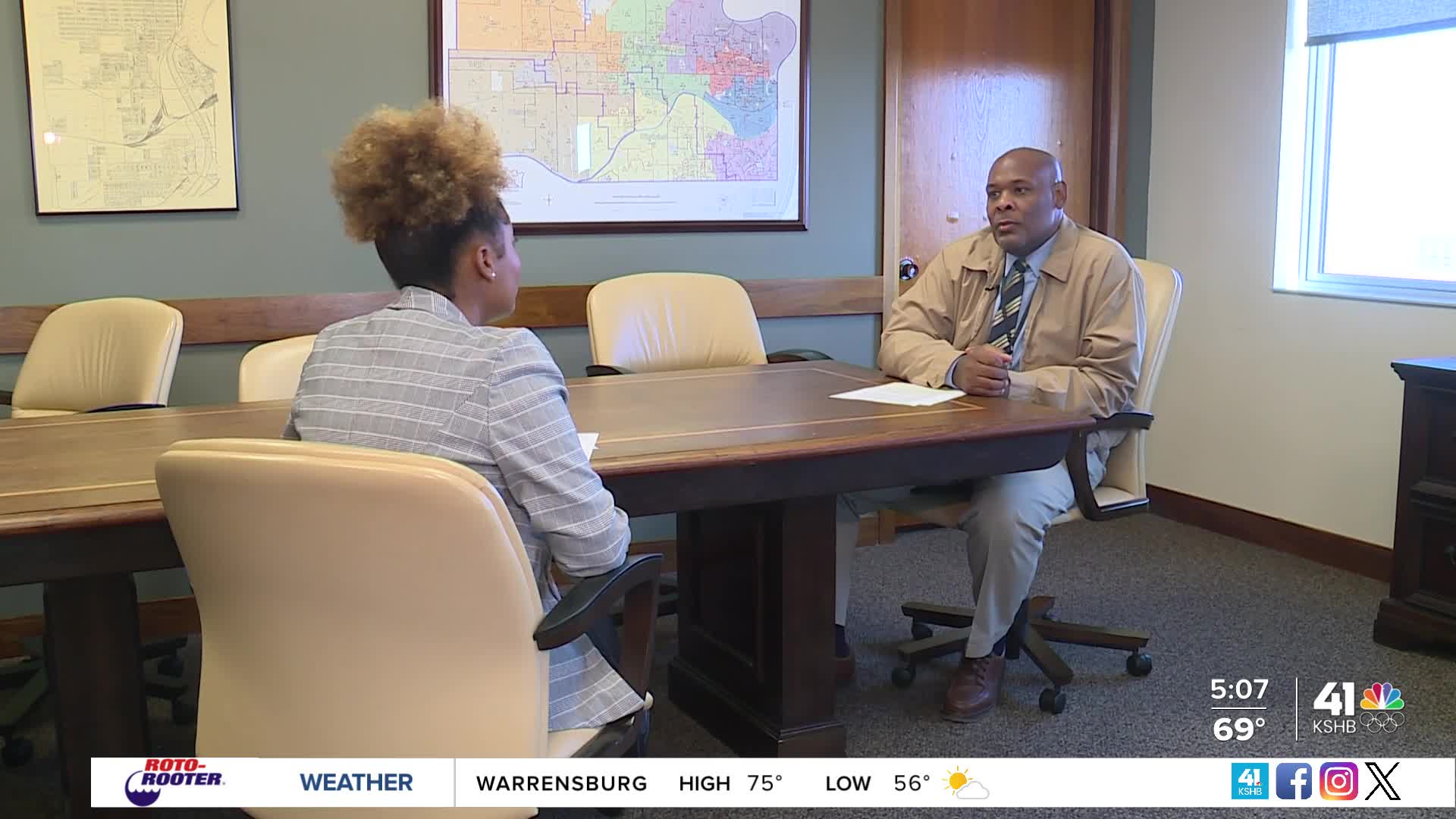KSHB 41 reporter Rachel Henderson covers neighborhoods in Wyandotte and Leavenworth counties. Share your story idea with Rachel.
—
Diversity is woven into the fabric of Kansas City, Kansas.
But its leaders have to thread the needle to protect it.
The Unified Government of Wyandotte County/Kansas City, Kansas recently voted to suspend diversity, equity and inclusion language to remain in compliance with federal guidelines.
The vote took place about an hour into the November 6 full commission meeting.
The UG’s legal counsel brought forth a resolution to “ensure the Unified Government’s full compliance with federal grant requirements.”
The synopsis reads: “A Resolution of the Unified Government of Wyandotte County/Kansas City, Kansas Suspending Enforcement of Certain Sections of the Unified Government Code of Ordinances, Resolutions, Regulations, Policies, Practices, and Customs to Ensure the Unified Government’s full compliance with federal grant requirements.”

The commission passed the resolution in a 6-2 vote.
Three commissioners were absent. Mayor Tyrone Garner was eligible to vote to reach the required six votes.
Commissioners Andrew Davis and Melissa Bynum voted no on the resolution.
The issue’s been discussed before in the Administration and Human Services Standing committee, but it did not pass.
Mayor Tyrone Garner said he approved its return to the full commission agenda because the legal counsel insisted and because there were more commissioners in the November 6 meeting than the standing committee meeting.

“I wanted the full commission to hear their presentation and their argument,” Garner said. “They wanted to make sure that the commission knew that we might not be in compliance with federal law. And that there were consequences associated with that. Not just civil, but criminal consequences that could potentially take place.”

Zee Bishop, a representative from the UG’s legal department, said the department was responding to changes in the federal landscape under the Trump Administration. Those include Students for Fair Admissions, Inc., v. Harvard, executive orders, agency memos and guidance documents, grant conditions and certifications and the False Claims Act.
Commissioner Davis challenged the applicability of the False Claims Act and asked for examples of it being applied thus far at the UG.
Though counsel could not provide examples, Bishop did say the federal government reached out twice to the UG within the past nine months to tell them that language in their program documents did not apply. That prompted the legal department to go back and make changes.
She said after they made changes, they received funding.
“This is not a theoretical threat,” Bishop said. “Our AmeriCorps program was out of compliance because it contained words such as health equity."
Counsel also outlined funding at risk, stating the UG spent $27,963,335 worth of federal funds in 2023.
They projected the 2024-2025 amount to be $80,714.383.
The UG is hundreds of millions of dollars in debt and has been for years.
Their presentation outlined an equation: Loss of Federal $ = loss of programs + loss of infrastructure + loss of up to 117 UG staff paid for with money from the federal government.
Programs at risk include meal services for seniors and WIC benefits, and other Health Department programs.
Counsel included housing assistance and emergency repair through Community Development Block Grant, HOME funding through the U.S. of Department of Housing and Urban Development.
That includes park restoration, housing units, local business owner investments, homelessness and winter shelter support.
The last impacted projects that included infrastructure improvements and construction.
“We have over 100 and some million dollars in need of infrastructure with just a couple of bridges,” said Commissioner Tom Burroughs, who voted in favor of the proposal.

Garner defended his vote, saying it was a “difficult decision” that left him with few options.
“As an elected official, I’m sworn to uphold local, state and federal laws,” Garner said. “It doesn’t feel good to me, especially as an African-American mayor, to know that for whatever reason, DEI, diversity equity and inclusion and that narrative is somehow being looked upon negatively.”
Wendy Green, assistant counsel with the Unified Government's legal department, echoed the mayor’s sentiment.
“Please know that when we made this recommendation, it was not easy for chief counsel and I to request that this come forward,” Green said. “We don’t like it either in particular.”
Green said it’s rare the legal department brings a recommendation first unless they strongly believe an action is necessary.
“We don’t agree with a lot of the things that come down from the federal government,” Garner said.
He argues that the decision to suspend rather than fully eliminate the DEI verbiage is important.
“They’re still there,” Garner said. We suspended them in an effort to make sure we were in compliance. Our values remain just as solid today as they were before that vote. Nobody is saying that what was in our policies is irrelevant or not important. That’s why we didn’t vote to do away with them."
But the ACLU of Kansas thinks otherwise.

Logan DeMond, director of policy and research for the ACLU of Kansas, submitted testimony in October over the initial standing committee vote to not proceed with eliminating the DEI verbiage.
“This sets a very dangerous precedent for the Unified Government,” DeMond said. “This will only serve to widen the glaring inequalities that already exist.”
DeMond works in Wichita, a city that suspended its DEI board earlier this year.
"What we have seen is the Unified Government forfeiting local control to the Trump Administration," DeMond said.
Other cities across state lines and throughout the country have been faced with similar decisions around DEI language.
“We know that Kansas City, Kansas, is the most diverse community we have in our great state, and I think it’s important to put up safeguards to protect that rather than tear down the protections that were put in place to address these glaring inequalities that we know still exist today,” DeMond said.
He disagrees with the idea of suspending language being a better alternative to eradicating it fully.
“I think this sets us down a really dangerous path,” DeMond said. “My question would be, 'What comes next?”
Garner only has a month left in office.
He says the suspension doesn't have a deadline.
"That’s going to be determined by future mayors," Garner said.
KSHB 41’s Rachel Henderson asked the incoming mayor-elect, Christal Watson, her thoughts on this issue in an exclusive sit-down interview on Tuesday.
“If it means you don’t say the word diversity, don’t say the word diversity,” Watson said. “Find another word.”
Watson says they have to “get creative” with how they represent.
“My stance is, let’s see what we can do with what we have, let’s try to do it based on what they’re requiring…and let’s see how far we get with it,” Watson said. “I don’t want people to get hung up on what the federal government says you can and can’t do. Just find a way, figure it out. Because my ancestors had to do it. And look at where we are today. I’m the first African American female mayor. I did not get here with everything handed out to me.”
Watson says she’s had to be resourceful before and that she’s willing to do it again.
“I just want the community to know it doesn’t matter what they say,” Watson said. “We are going to find a way, and we are going to be successful.”
Garner says he still champions diversity, equity and inclusion, regardless of how the vote turned out.
“I can tell you this mayor is going to continue to be a strong advocate and a champion for diversity, equity and inclusion,” Garner said. “We are obligated as a government institution to be in compliance with federal law. Doesn’t mean it felt good. Doesn’t mean that we agree with those interpretations, but we are obligated to make sure we are in compliance with federal law.”
The commission also discussed an ordinance immediately after the resolution to alter language related to the legal department’s options when it comes to certain discrimination claims.
The commission voted to table the motion after confusion surrounding the process and interpretation of the current UG code.
Garner requested the legal department review the ordinance and bring back at a later date.
—





